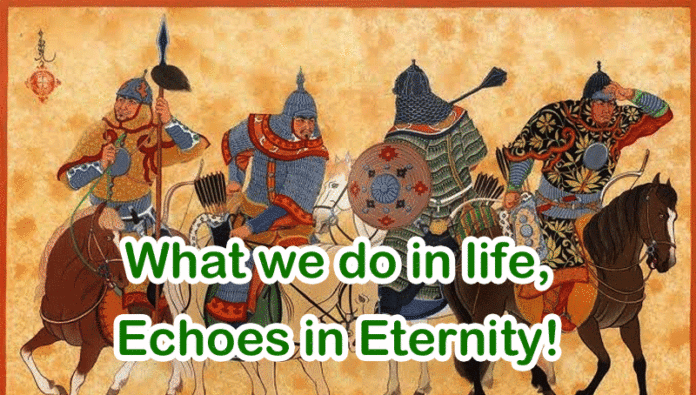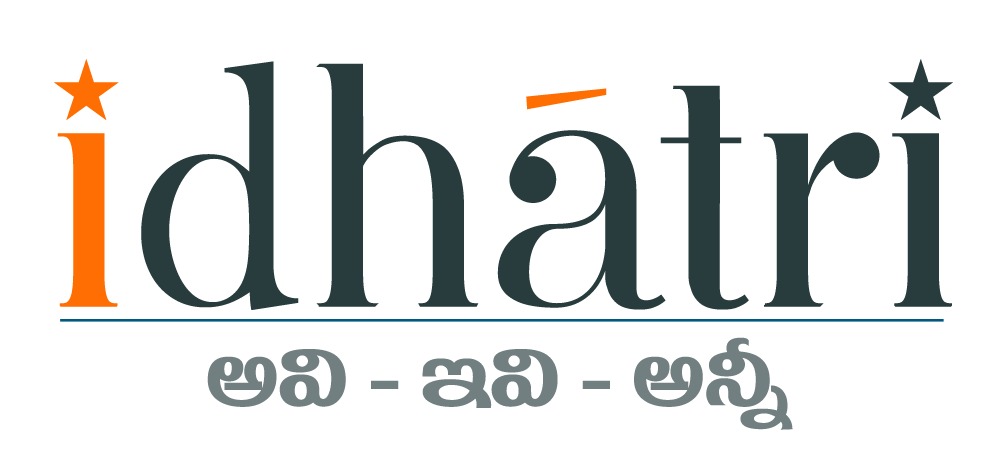This article is not a recap of Genghis Khan’s achievements and brutality, that can be prompted out by any A.I chatbot, rather it is an attempt to jot down my views on the staggering piece of prose that was crafted by the Telugu novelist named Tenneti Suri on the Mongolian behemoth Genghis Khan.

Review of Tenneti Suri’s Genghis Khan:
The environment we live in shapes us. It defines our habits, our values and our mentality. Although the base emotions humans experience are the same: love, loss, happiness to name a few, the sheer diversity of humanity arises due to the varied biomes we inhabit. Right from the Ethiopian highlands where we originated to the glacial plateaus of Antarctica, we are everywhere. And just like these biomes the varying cultures of humanity throughout the globe share as many similarities as differences. In my view the diversity arises due to the fact that humans; similar though we are in our biological makeup, we are always in a quest to tame nature to better suit us. This struggle to attain equilibrium with the surrounding nature gives rise to a collective culture, mentality and psychology of a civilisation. Out of all the environments that humans have had a foothold, none surprises me more than the story of the unforgiving rain shadow region of the Himalayas called the Gobi desert. This desert gave birth to a tribal leader who conquered a third of the planet with the most primal and dangerous weapon of the human spirit: Willpower. His name was Genghis Khan.

To quote a character from the genre defining blockbuster movie Ironman (2008), “The bow and arrow once was the pinnacle of weapons technology. It allowed the great Genghis Khan to rule from the Pacific to the Ukraine. An empire twice the size of Alexander the Great and four times the size of the Roman Empire.” This line was my first introduction to Genghis Khan. I must have been 7-8 years old when we rented a DVD of Ironman from a video rental store in Anand Nagar Colony. I clearly remember asking my mother who Genghis khan was after this line was uttered by one of the characters. Immediately dad narrated a line from the Telugu epic novel “Genghis Khan” referring to a man vs wild scenario of the Gobi desert. Those lines are the following:
“గోబీ ఎడారిలో ఎముకలు కొరికే చలి పగళ్లతో, సమస్తప్రపంచాన్ని గడ్డకట్టించే రాత్రుళ్లతో యుద్ధం చేసి ప్రకృతిమీదపైచేయి సాధించినవాడు ఛంఘిజ్ ఖాన్. అతడి హృదయంలోబద్దలైన అగ్నిపర్వతాలకు ఆ మంచు పర్వతాలు కరిగి దారిఇచ్చాయేమో!”
(The all-consuming volcanoes erupting from the depths of Genghis Khan’s heart has won over the spine chilling cold of the Gobi desert and paved the path through the depths of this abyss)
With a vague memory of these lines I recently added this book to a never ending list of books to read and left it to that for the time being.

Telugu and Mongolian, these are two languages and cultures totally different from one another with seemingly no connection between the two. I used to wonder about the readability of such a paradoxical piece of prose. “How can I possibly read a 400 paged Telugu novel about a Mongolian tyrant, that too written in the 1950s?!“ that was my response whenever dad used to persuade me to read Tenneti Suri’s Genghis khan novel. Virtually every family trip in any of the cold or harsh terrains of our country be it Kashmir, Manali , Ladakh or even Rajasthan is incomplete without my parents quoting a line or two from this book. With a recently acquired penchant for adventure and horror literature, I felt confident enough to finally tackle an epic novel of my own mother tongue.

The book is quite complex and hefty in the subject material it deals with. On one hand the author shows us the severity of life in the Mongolian heartland where the lines between the civilized and the savage were blurred. On the flip side it does not shy away from the moral and ethical dilemmas that have to be tackled when dealing about an emperor who has committed mass genocides. Although the book sometimes feels like a response to the then prevalent western view on Genghis Khan, it is never didactic. The author’s beautiful mastery of the Telugu language immerses the reader in the world of 12-13th century Mongolia without ever feeling preachy. But the achievement of this book in my opinion is the author’s idea to deal with events only prior to the crowning of the young Temujin as Genghis khan. Where most of the western authors paid huge attention to the effect of Genghis khan’s invasions and wars, Tenneti Suri focused on the making of the man behind the myth. In doing so, Suri has dealt with themes such as charismatic leaders, the stronghold of prophecies on nomadic tribes and the rise of messianic figures which make for good storytelling and also social commentary. As these themes find their echoes in contemporary society it is not a surprise that the book feels quite modern in its ideas. The core of the story is the ideological rift between the peace loving idealist Jhamuga and his practical and adventurous brother Temujin (Genghis khan) . It is through their conversations and internal turmoil that we get an opportunity to peep into the life of 12th century Mongolia. Like a Matryoshka doll the author reveals the layers of treachery that was effected upon the Mongol tribes by their civilized neighbors and how the desert people led Temujin into becoming the feared conqueror we know today.

The point that stunned me the most was how similar the themes dealt in this book (written in 1956) were to Frank Herbert’s science fiction magnum opus Dune(1963) which also deals with the same themes set on a different planet and in a different time. This is a testament to the research that both Tenneti Suri and Frank Herbert have done in dealing with people belonging to harsh regions and severe lifestyles .Where Herbert’s book was a fictitious tale on the rise of a charismatic leader and his psychological superiority on the natives, Suri’s work feels like an epic undertaking to understand the psychology of an ambitious human being who was born to the desert and led his own people to glory.
On reading this book the reader will know that the author was well aware not just of the geopolitical tensions of the world in the early 1950s but also of the civilized cruelty of great empires like Rome, China and others alike .He clearly understood the double standards and sadistic pleasures of the empires who perpetuated savagery on its subjects under the name of god and glory. The author mentions in the preface about the western parallels between the rise of Hitler in the 1930s and the rise of Genghis khan. In denouncing the atrocities of Hitler and praising Genghis Khan one might feel that Tenneti Suri’s work is inclined to having taken a partial view towards the Mongols. However in my opinion the author’s work feels like an honest undertaking to lay the fact and present an engaging story of a man who first tamed the Gobi desert then went on to unite the Mongol tribes and then the Eurasian world at large. A story set in the 12th century cannot have the evolved ideals of the 21st. But the people in the 21st century can try to understand the cause and effect behind the soul stirring brutality and also the humanity of the past. Such understanding is something that can enrich our lives and enhance our appreciation for the elements of civil law and order in our society today.

So for anyone who is interested in learning more about the adventurous life of this child of the Gobi desert check out this book and give into the pleasures of reading peak Telugu prose.
Amazon Link: https://amzn.in/d/duMOMXY
You can also listen to the equally fantastic radio adaptation of the same novel by writer Indraganti Sreekanta Sharma.
For anyone with an interest for movie soundtracks try to read this book with the “Dune” movie soundtrack playing in the background. You will instantly get the feel and the similarities of both the works.
Also check out Mongolian throat singing videos and Mongolian horseback archery videos on youtube. It gives an idea of how strong the Mongol warriors were.
-Sujay Pamidikalva
[email protected]
YouTube – ధాత్రి మహతి
Twitter – ఐధాత్రి2
Facebook – ఐధాత్రి తెలుగు
Instagram – ఐధాత్రి తెలుగు


